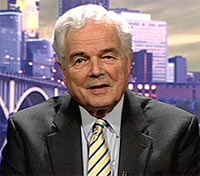 Following is an excerpt from an interview with Bob Abernethy that will appear in a forthcoming issue of The Wittenburg Door.
Following is an excerpt from an interview with Bob Abernethy that will appear in a forthcoming issue of The Wittenburg Door.
GARRISON: When you reflect over your years of doing Religion & Ethics Newsweekly, how would you assess the role of religion in America?
ABERENETHY: I think one of other things that is going to be more and more interesting and important is figuring out how the three major Abrahamic religions can live together peacefully and respectfully. Efforts to figure out how Christianity and Islam can coexist in respectful ways will be a good long running story. I hope to do some things on that. Also, I would hope that after a generation of declining numbers and aging membership that the Protestant mainline would pick itself up and develop a little confidence in its tradition. I'd like to see them get on with the business of being a church and helping everybody around it.
GARRISON: Why did you come out with the book The Life of Meaning?
ABERNETHY: What Bill Boyle and I have done is take the transcripts of those interviews that were done originally for Religion and Ethics & Newsweekly, but were used only in the smallest part in the program or on our website. We edited 60-some interviews into little essays. They run the gamut from the spiritual but not religious over to the most traditional and conservative faith traditions. As with the program, there's no preaching just these wonderful ideas that are there for the taking
GARRISON: How does your own faith influence the overall ethos of the program and the book?
ABERNETHY: First of all, it supported my interest in the subject. Also, it helped make all of us who do these interviews more sensitive to the spiritual experience of others and respectful of that experience. Maybe people sensed that and therefore, they felt free to speak really beautifully about the things that mattered to them.
GARRISON: How can one practice their faith while remaining an objective journalist when covering controversial religious stories?
ABERNETHY: I've been around a while and I grew up in the business thinking there should be a clear separation between news reporting and editorializing. When you're editorializing, you should label it as such. I think that's sometimes not honored as strictly as it should be. My advice would be if you're going to editorialize, don't be shy about identifying it as such.
GARRISON: Any thoughts about the rise of a progressive left that seems poised to do battle with the Religious Right?
ABERNETHY: All religion whether it's left, right or center has to be very, very wary of getting too close to power. People have been burned by that for centuries. It's a big, big danger. I think some people on the Religious Right have discovered this in their own case. And I would hope if any other religious group is trying to have political influence that they would be very careful about that. The spate of books about atheism has probably been encouraged by their authors' feeling that the religious right was too powerful and having too much of an influence in politics.
GARRISON: As we approach the 2008 election, we see both Republican and Democratic presidential candidates playing the faith card.
ABERNETHY: I think it's fair to ask candidates for president of the United States questions about their deepest beliefs. Seems to me that in understanding what a candidate is like, it's important to understand where they're coming from, what they think are bedrock truths, what they care the most about. And if they're religious folks, that's something the voters should know about. If they have deep religious convictions, presumably those convictions have an influence on how they live their lives and the decisions they make.
 Publishers Weekly cited Becky Garrison as one of "four evangelicals with fresh views" alongside Jim Wallis, Shane Claiborne and Ron Sider.
Publishers Weekly cited Becky Garrison as one of "four evangelicals with fresh views" alongside Jim Wallis, Shane Claiborne and Ron Sider.
Got something to say about what you're reading? We value your feedback!